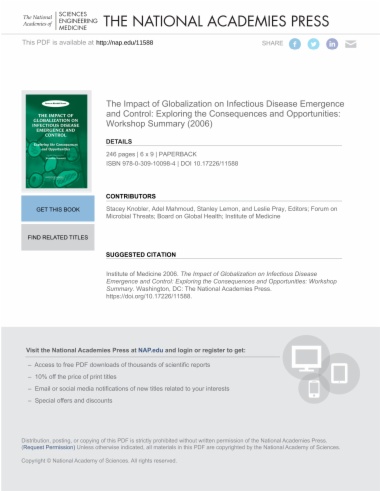

Globalization is by no means a new phenomenon; transcontinental trade and the movement of people date back at least 2,000 years, to the era of the ancient Silk Road trade route. The global spread of infectious disease has followed a parallel course. Indeed, the emergence and spread of infectious disease are, in a sense, the epitome of globalization. Although some experts mark the fall of the Berlin Wall as the beginning of this new era of globalization, others argue that it is not so new. The future of globalization is still in the making. Despite the successful attempts of the developed world during the course of the last century to control many infectious diseases and even to eradicate some deadly afflictions, 13 million people worldwide still die from such diseases every year.
On April 16 and 17, 2002, the Forum on Emerging Infections held a working group discussion on the influence of globalization on the emergence and control of infectious diseases. The contents of the unattributed sections are based on the presentations and discussions that took place during the workshop.
The Impact of Globalization on Infectious Disease Emergence and Control report summarizes the presentations and discussions related to the increasing cross-border and cross-continental movements of people and how this could exacerbate the emergence and global spread of infectious diseases. This report also summarizes the means by which sovereign states and nations must adopt a global public health mind-set and develop a new organizational framework to maximize the opportunities and overcome the challenges created by globalization and build the necessary capacity to respond effectively to emerging infectious disease threats.